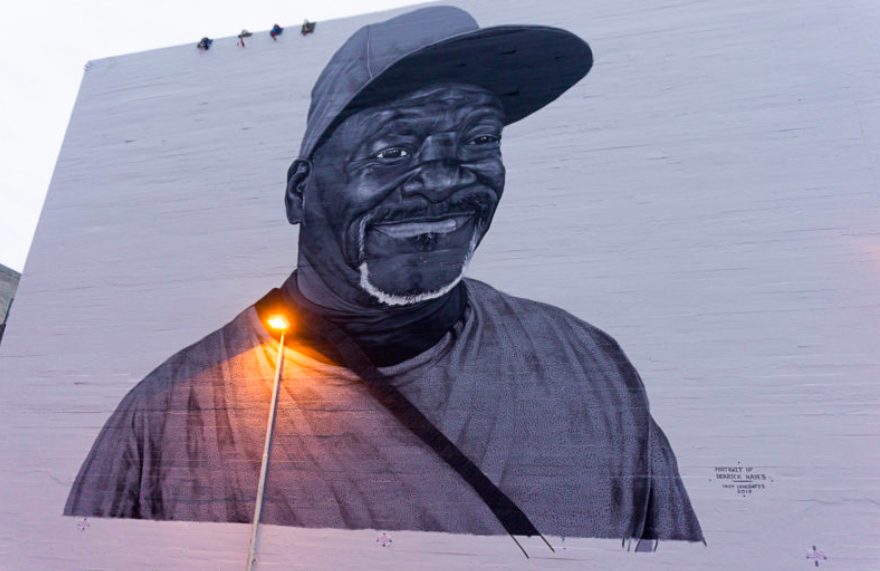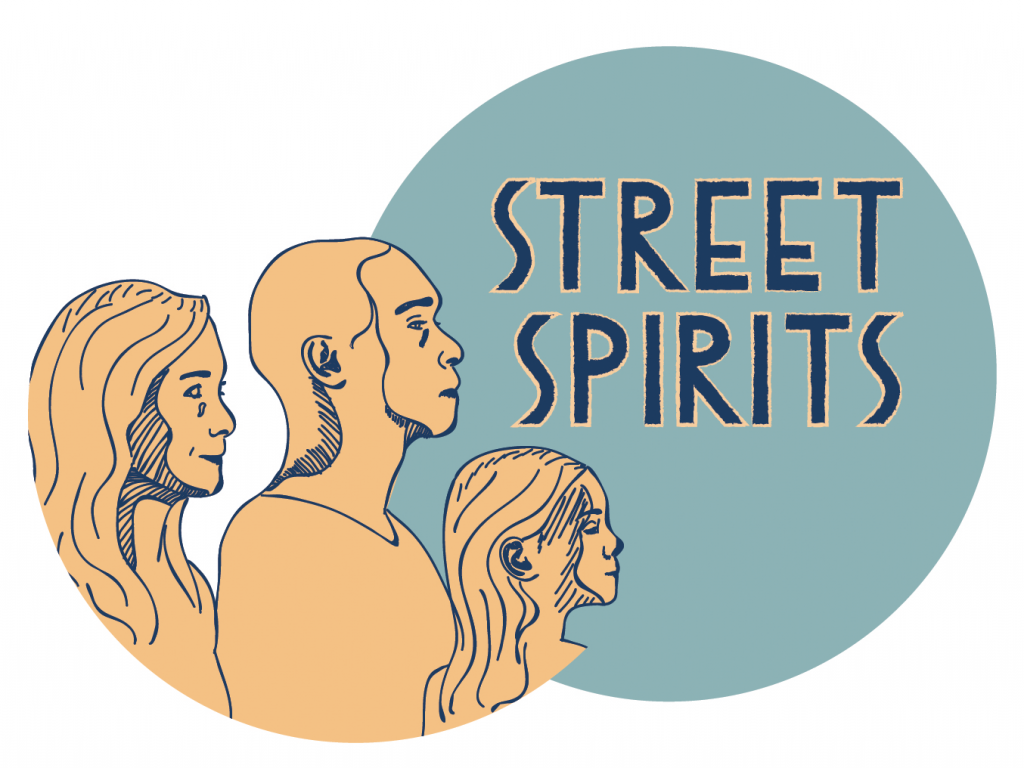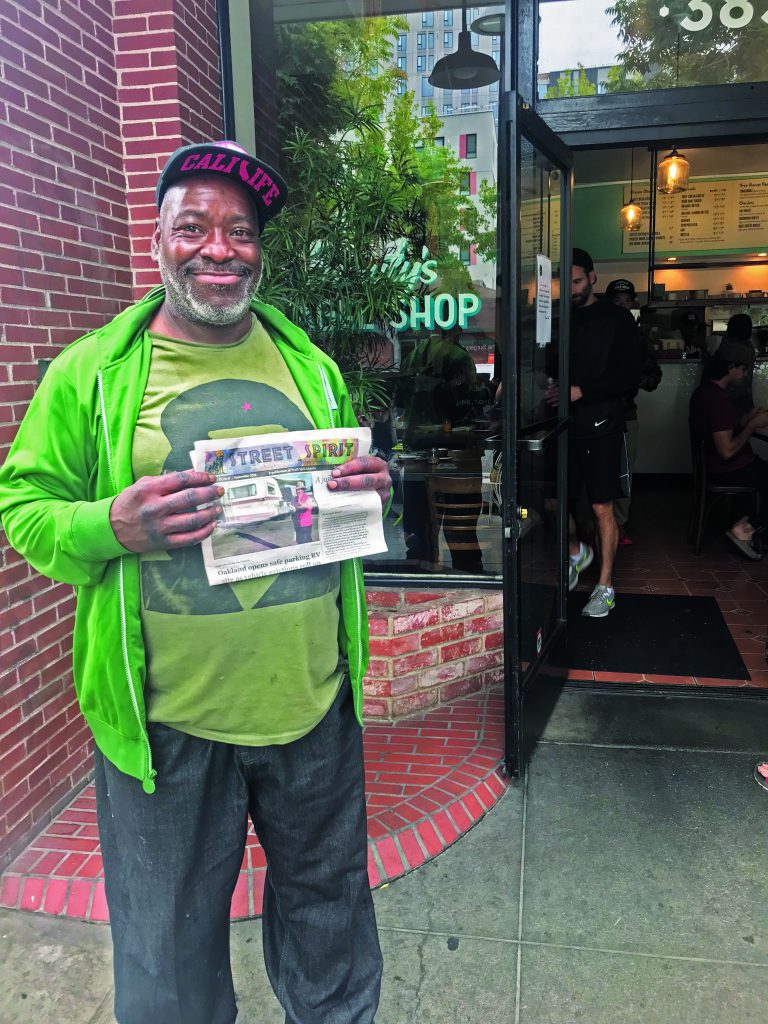

Walking down Franklin Street in Downtown Oakland you’ll see a larger than life mural of a man in a baseball cap. With gentle eyes and a wide smile, he looks east over the city, watching over the people passing by. Small businesses line Franklin Street to the left and right. Below the mural is a parking lot, and shiny office buildings tower above. In between lies the portrait of Derrick Hayes, a 59-year-old homeless resident of Oakland who has been selling Street Spirit for almost 20 years.
Hayes—known to many as Brother Hayes—was manning one of his usual posts, outside the Peet’s Coffee on Piedmont Avenue, when he caught the attention of Jerry Smith—the president of a commercial real estate firm that revitalizes historic buildings. Like many of the things that make Hayes a staple of Oakland, the mural’s origin story begins with his contagious spirit.
“He had this huge smile, he was unbelievably engaging,” Smith says. “He just seemed like a good person.”
Smith is a frequent patron of the Peet’s on Piedmont Avenue where Hayes often sells Street Spirit. The two would talk nearly every morning, and over time, they got to know each other. So when Smith’s firm was searching for a subject to paint on a building at 14th and Franklin, Hayes came to mind.
“[We were looking for] a real, street-level Oakland individual,” says Troy Lovegates, the painter commissioned for the mural. “A chip off of the actual city.”
That’s how Derrick Hayes landed on the side of a downtown building, making a monument of his spirit: an abiding presence in the fast-changing city, his smiling face just around any Oakland corner.
The mural captures something true about Hayes. He emanates warmth, and always looks out for his community. Standing outside the Peet’s on Piedmont, or Beauty’s Bagels on Telegraph Avenue, he greets café patrons with a fist bump or a wave. When a meter maid starts making their way up the block, he pokes his head inside and warns, “They writin’ tickets out here!” He calls out to the children who pass by day after day on their way to school. “Study hard,” he says. “You’re going to make a difference!”
“How do you go from a gangster to a cry baby?”
Hayes describes himself as very sensitive. He is quick to cry when speaking about his experiences, but he is also quick to share stories about formative moments in his life. There’s the day when he hit a man with his car, and held his hand as he died right there on the street; the moment when he saved two little boys from being run over by a driver who rolled through a stop sign; the community he built in the San Quentin choir while serving time.
“How do you go from a gangster to a cry baby?” he asks. “But I did, and I’m glad about it.”
This metamorphosis didn’t happen overnight. To explain how he transformed into the person he is today, Hayes recalls an afternoon when he was selling Street Spirit on Piedmont Avenue, and noticed an 11 year-old girl being bothered by an older man. Hayes watched this man follow and then assault the girl—so he stepped in to help. He threw the man to the ground, and held him until the police came.
The next morning the girl came back to the same street corner with her mother and asked, “Mommy, when I go back to school, is the bad man going to be there?” Her mother shook her head. The girl looked at Hayes. “When I get back to school, is the good man going to be there?”
As Hayes remembers the story, his eyes fill with tears. “Ain’t that something?” He pauses, then says, “I’ve done a lot of bad in my life, but the good things should be accounted for.”
Hayes was born in Chicago, where he got involved with gangs at a young age. He grew up in North Lawndale, a high-crime neighborhood known as K-Town. For a long time it felt like there was no way out. “My mother couldn’t do nothing about us being in gangs,” Hayes said. “As a matter of fact she encouraged it, because she didn’t want to get firebombed and moved out (of) the neighborhood.”
But eventually Hayes and his family got out of Chicago. When he was around 15, his mother married a man 20 years her senior who gave them some mobility. The marriage led Hayes and his three siblings to Sanford, Florida, where he attended high school.
Hayes’ life was transformed when his family moved to Florida. He spent his teenage years in Sanford, and several years bouncing around Florida after that. He was an excellent athlete who played baseball and basketball. He even played on a team with Tim Raines, who was inducted into the baseball hall of fame in 2017.

Through his mother, he was also introduced to the world of higher education. When they arrived in Florida, she enrolled in music school at the University of Central Florida. This was a big deal for his family. His mother had been a classical pianist and child prodigy, but put her education on hold to raise her family. Now, she was able to pursue her education, which inspired Hayes immensely. She graduated at the age of 44—Suma Cum Lade.
Hayes remembers one particular day with crystal clarity. His mother played a recital, which he attended with his siblings and their children. They were the only black people at the event. “To see her flourish in that room…for people to throw flowers at her feet, it was mind blowing,” he says. “Gang banging in Chicago was tumultuous. When I got to Florida, I found out I had a brain.”
Though he enjoyed his life in Florida, Hayes moved to Hayward, California at the age of 36 after running into trouble. When he first arrived in 1996, he moved in with the mother of two of his children, who were 13 and 14 at the time. But facing objections from her new boyfriend, Hayes moved out just two months later.
Alone and with nowhere to go, he moved to the streets of Oakland, where he resorted to old habits. He started using and selling cocaine. “That was the 90’s,” Hayes said. “That was what Oakland was like. I became well known for dealing and playing basketball.”
Hayes soon found his way to the homeless shelter in the Veterans Memorial Building on Center Street in Downtown Berkeley. At the time, shelter guests had to be out the door early in the morning. Still groggy, Hayes formed a habit of boarding BART trains to catch some extra sleep.
He began to notice the same woman every morning on the train, commuting to work. One day, he stayed awake and introduced herself. He learned her name, Linda Masters, and they made plans to meet after work to get to know each other. Over the next few weeks they hit it off and he moved into her apartment. She and Hayes lived together for the next 20 years.
For close to two decades, the couple lived in an apartment building in Downtown Oakland that Hayes calls “pink palace” for its bright paint job. They had a happy relationship until she fell ill in 2015. “For the first two years, I paid all her medical bills myself,” Hayes said. “I paid the bills by selling Street Spirit.”
After Masters fell sick, Hayes’ housing fell into jeopardy. In 2017 Masters moved to Washington to live with her son and attend to her health. After she left, their landlord took Hayes to court. The landlord argued that with Masters’ departure, he was now a single occupant and had to sign a new lease. This meant a major rent increase, from about $600 to $1,300 per month—a price Hayes could not pay. After 20 years, he was back on the street. He has been living in a tent for the last nine months.
Living on the street is hard, but as always, Hayes is looking on the bright side. He has found an opportunity in his new circumstances: to move back to Florida to be closer to his ailing mother. And while it may be difficult for him to part with the community he has built in Oakland, he is excited about the opportunity to reconnect with his mom.
“She’s my hero,” he says. “That’s why I’m moving back to Florida.”
Hayes would like to surprise his mother by arriving home on Thanksgiving Day. His community is ready to support him in reaching this goal. “A group of people who buy my paper outside the Hive are going to send me home,” he says. “I just have to say when.”
Street Spirits is a feature in which someone who lives on the street tells us their story.
Alastair Boone is the Director of Street Spirit.
